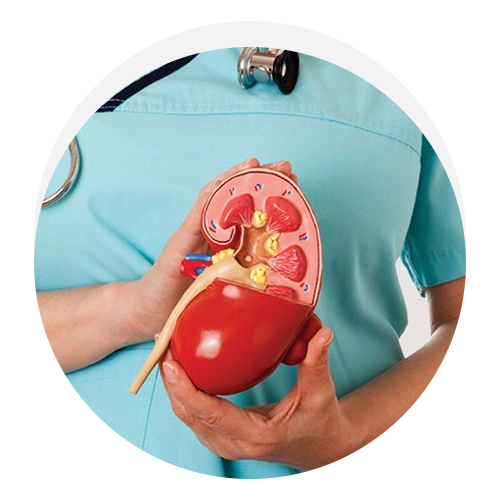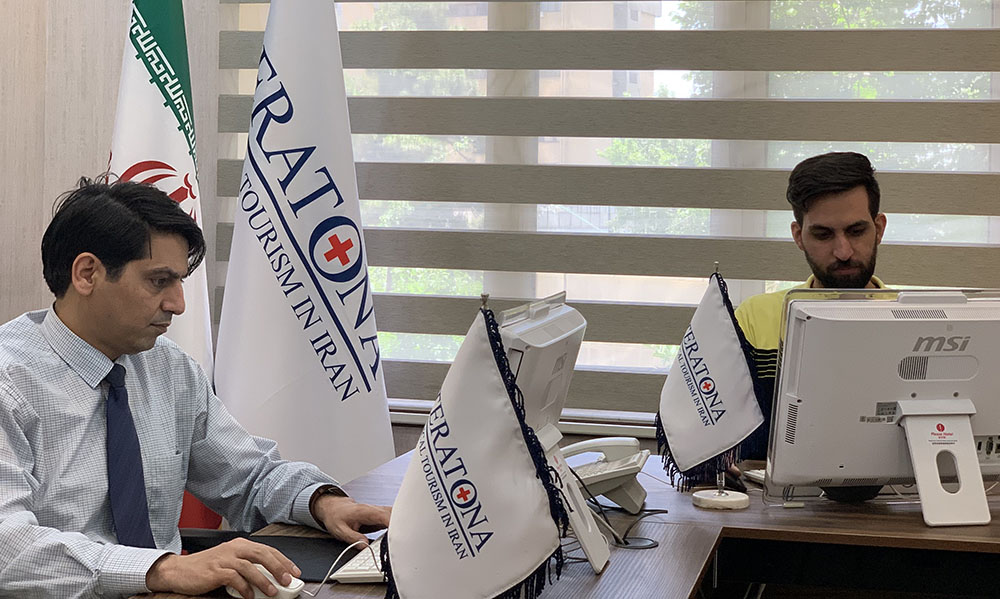What is kidney transplant?
A kidney transplant is a surgical procedure to place a healthy kidney from a living or deceased donor into a person whose kidneys no longer function properly.
The kidneys are two bean-shaped organs located on each side of the spine just below the rib cage. Each is about the size of a fist. Their main function is to filter and remove waste, minerals and fluid from the blood by producing urine.
When your kidneys lose this filtering ability, harmful levels of fluid and waste accumulate in your body, which can raise your blood pressure and result in kidney failure (end-stage kidney disease). End-stage renal disease occurs when the kidneys have lost about 90% of their ability to function normally.
Certain people with kidney failure, a kidney transplant may be more risky than dialysis. Conditions that may prevent you from being eligible for a kidney transplant include:
Advanced age
Severe heart disease
Active or recently treated cancer
Dementia or poorly controlled mental illness
Alcohol or drug abuse
Any other factor that could affect the ability to safely undergo the procedure and take the medications needed after a transplant to prevent organ rejection.
Compared with dialysis, kidney transplant is associated with:
Better quality of life
Lower risk of death
Fewer dietary restrictions
Lower treatment cost
Risks
Kidney transplantation can treat advanced kidney disease and kidney failure, but it is not a cure. Some forms of kidney disease may return after transplant.The health risks associated with kidney transplant include those associated directly with the surgery itself, rejection of the donor organ and side effects of taking medications (anti-rejection or immunosuppressants) needed to prevent your body from rejecting the donated kidney. Deciding whether kidney transplant is right for you is a personal decision that deserves careful thought and consideration of the serious risks and benefits. Talk through your decision with your friends, family and other trusted advisors.
Complications of the procedure
Kidney transplant surgery carries a risk of significant complications, including:
Blood clots and bleeding
Leaking from or blockage of the tube (ureter) that links the kidney to the bladder
Infection
Failure or rejection of the donated kidney
An infection or cancer that can be transmitted with the donated kidney
Death, heart attack and stroke
Anti-rejection medication side effects
After a kidney transplant, you’ll take medications to help prevent your body from rejecting the donor kidney. These medications can cause a variety of side effects, including:
Bone thinning (osteoporosis) and bone damage (osteonecrosis)
Diabetes
Excessive hair growth or hair loss
High blood pressure
High cholesterol
Other side effects may include:
Increased risk of cancer, particularly skin cancer and lymphoma
Infection
Puffiness (edema)
Weight gain
Acne
Evaluation
At the transplant center, you’ll be evaluated to determine whether you meet the center’s eligibility requirements for a kidney transplant.
The team at the transplant center will assess whether you:
Are healthy enough to have surgery and tolerate lifelong post-transplant medications
Have any medical conditions that would interfere with transplant success
Are willing and able to take medications as directed and follow the suggestions of the transplant team
The evaluation process may take several days and includes:
A thorough physical exam
Imaging studies, such as X-ray, MRI or CT scans
Blood tests
Psychological evaluation
Any other necessary testing as determined by your doctor
After your evaluation, your transplant team will discuss the results with you and tell you whether you’ve been accepted as a kidney transplant candidate. Each transplant center has its own eligibility criteria. If you aren’t accepted at one transplant center, you may apply to others.
Before the procedure
Finding a match
A kidney donor can be living or deceased, related or unrelated to you. Your transplant team will consider several factors when evaluating whether a donor kidney will be a good match for you.
Tests to determine whether a donated kidney may be suitable for you include:
Blood typing.It’s preferable to get a kidney from a donor whose blood type matches or is compatible with your own. Blood-type incompatible transplants are also possible but require additional medical treatment before and after transplant to reduce the risk of organ rejection. These are known as ABO incompatible kidney transplants.
Tissue typing.If your blood type is compatible, the next step is a tissue typing test called human leukocyte antigen (HLA) typing. This test compares genetic markers that increase the likelihood the transplanted kidney will last a long time. A good match means it’s less likely that your body will reject the organ.
The third and final matching test involves mixing a small sample of your blood with the donor’s blood in the lab. The test determines whether antibodies in your blood will react against specific antigens in the donor’s blood. A negative crossmatch means they are compatible and your body isn’t as likely to reject the donor kidney. Positive crossmatch kidney transplants also are possible but require additional medical treatment before and after the transplant to reduce the risk of your antibodies reacting to the donor organ.
Additional factors your transplant team may consider in finding the most appropriate donor kidney for you include matching age, kidney size and infection exposure.
Staying healthy
Whether you’re waiting for a donated kidney or your transplant surgery is already scheduled, work to stay healthy. Being healthy and as active as you’re able can make it more likely you’ll be ready for the transplant surgery when the time comes. It may also help speed your recovery from surgery. Work to:
Take your medications as prescribed.
Follow your diet and exercise guidelines
.Don’t smoke. If you need help quitting, talk to your doctor.
Keep all appointments with your health care team.
Stay involved in healthy activities, including relaxing and spending time with family and friends.
Stay in touch with your transplant team and let them know of any significant changes in your health.Keep your packed hospital bag handy, and make arrangements for transportation to the transplant center in advance.
During the procedure
Kidney transplants are performed with general anesthesia, so you’re not awake during the procedure. The surgical team monitors your heart rate, blood pressure and blood oxygen level throughout the procedure.
During the surgery:
The surgeon makes an incision in the lower part of one side of your abdomen and places the new kidney into your body. Unless your own kidneys are causing complications such as high blood pressure, kidney stones, pain or infection, they are left in place.
The blood vessels of the new kidney are attached to blood vessels in the lower part of your abdomen, just above one of your legs.
The new kidney’s ureter — the tube that links the kidney to the bladder — is connected to your bladder.
After the procedure
After your kidney transplant, you can expect to:
Spend several days to a week in the hospital.Doctors and nurses monitor your condition in the hospital’s transplant recovery area to watch for signs of complications. Your new kidney will make urine like your own kidneys did when they were healthy. Often this starts immediately. In other cases it may take several days, and you may need temporary dialysis until your new kidneys begin to function properly. Expect soreness or pain around the incision site while you’re healing. Most kidney transplant recipients can return to work and other normal activities within eight weeks after transplant. No lifting objects weighing more than 10 pounds or exercise other than walking until the wound has healed (usually about six weeks after surgery).
Have frequent checkups as you continue recovering. After you leave the hospital, close monitoring is necessary for a few weeks to check how well your new kidney is working and to make sure your body is not rejecting it. You may need blood tests several times a week and have your medications adjusted in the weeks following your transplant. During this time, if you live in another town, you may need to make arrangements to stay near the transplant center.
Take medications the rest of your life. You’ll take a number of medications after your kidney transplant. Drugs called immunosuppressants (anti-rejection medications) help keep your immune system from attacking and rejecting your new kidney. Additional drugs help reduce the risk of other complications, such as infection, after your transplant.
Results
After a successful kidney transplant, your new kidney will filter your blood, and you will no longer need dialysis.
To prevent your body from rejecting your donor kidney, you’ll need medications to suppress your immune system. Because these anti-rejection medications make your body more vulnerable to infection, your doctor may also prescribe antibacterial, antiviral and antifungal medications.
It is important to take all your medicines as your doctor prescribes. Your body may reject your new kidney if you skip your medications even for a short period of time. Contact your transplant team immediately if you are having side effects that prevent you from taking your medications.
After your transplant, skin self-checks and checkups with a dermatologist to screen for skin cancer and keeping your other cancer screening up-to-date is strongly advised.
Kidney transplant success rates
If your new kidney fails, you can resume dialysis or consider a second transplant. You may also choose to discontinue treatment. If you decide to discontinue treatment, your doctor can give you medicines to help relieve your symptoms. This decision depends on your current health, your ability to withstand surgery and your expectations for maintaining a certain quality of life.
It’s normal to feel anxious or overwhelmed while waiting for a transplant or to have fears about rejection, returning to work or other issues after a transplant. Seeking the support of friends and family members can help you cope during this stressful time.
Your transplant team can also assist you with other useful resources and coping strategies throughout the transplant process
Diet and nutrition
After your kidney transplant, you may need to adjust your diet to keep your new kidney healthy and functioning well. You’ll have fewer dietary restrictions than if you were receiving dialysis therapy before your transplant, but you still may need to make some diet changes.
Your transplant team includes a nutrition specialist (dietitian) who can discuss your nutrition and diet needs and answer any questions you have after your transplant.
Some of your medications may increase your appetite and make it easier to gain weight. But reaching and maintaining a healthy weight through diet and exercise is just as important for transplant recipients as it is for everyone else to reduce the risk of heart disease, high blood pressure and diabetes.
You may need to keep track of how many calories you consume or limit foods high in sugar and fat.
Your dietitian will also provide you with several healthy food options and ideas to use in your nutrition plan. Your dietitian’s recommendations after kidney transplant may include:
Eating at least five servings of fruits and vegetables each day
Avoiding grapefruit and grapefruit juice due to its effect on a group of immunosuppression medications (calcineurin inhibitors)
Having enough fiber in your daily diet
Drinking low-fat milk or eating other low-fat dairy products, which is important to maintain optimal calcium and phosphorous levels
Eating lean meats, poultry and fish
Your dietitian may also recommend:
Maintaining a low-salt and low-fat diet
Following food safety guidelines
Staying hydrated by drinking adequate water and other fluids each day
Exercise
Once you recover from your transplant surgery, exercise and physical activity should be a regular part of your life to continue improving your overall physical and mental health.
After a transplant, regular exercise helps boost energy levels and increase strength. It also helps you maintain a healthy weight, reduce stress, and prevent common post-transplant complications such as high blood pressure and cholesterol levels.
Your transplant team will recommend a physical activity program based on your individual needs and goals.
Soon after your transplant, you should walk as much as you can. Gradually, start incorporating more physical activity into your daily life, including participating in at least 30 minutes of moderate exercise five days a week.
Walking, bicycling, swimming, low-impact strength training and other physical activities you enjoy can all be a part of a healthy, active lifestyle after transplant. But be sure to check in with your transplant team before starting or changing your post-transplant exercise routine.







